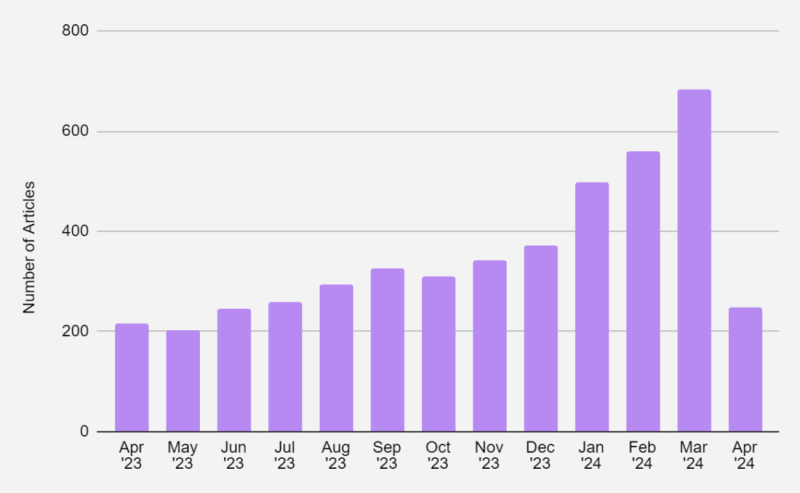Introduction
In this edition of Bridgehead Social Care's monthly news round-up we examine the adult social care sector's news coverage over the past month.
Between 1 and 30 April, references to 'adult social care' appeared in 249 unique media articles across the UK, a figure more than 60 per cent lower than March's coverage statistics, which stood at 682 articles.
For context, the chart below plots mentions of adult social care on a month-by-month basis over the past 12 months.

Coverage in April focused on several key recurring themes concerning the problems relating to local authorities struggling to maintain financial stability whilst coping with increasing demand for services, including adult social care. However, there was also a spike in coverage relating to unpaid carers made particularly relevant due to the Carer's Leave Act coming into force on April 6, and recent revelations of fines being issued regarding breaching Carer's Allowance earnings rules.
A central focus of newspapers, including The Independent, The Guardian and BBC News, focused on the Carer's Leave Act and the new right for employees to take up to five days of unpaid leave a year to arrange or provide care for a loved one. Alongside this was the publication of a major report from Goodoaks Homecare's You Are Not Alone campaign. The report revealed that, among unpaid carers in England, more than half (55 per cent) felt unable to meet their own health and wellbeing needs whilst a fifth do not have a good understanding of any care and support options. Particularly relevant, it was found that just one-third of unpaid carers described themselves as "very" or "somewhat" aware of the provisions laid out in the Carer's Leave Act with a majority (51 per cent) describing themselves as somewhat or very unaware. The findings indicate the importance of translating policy and legislative progress into practice by making carers more aware of the options available to them.
The Guardian reported on the growing scandal of unpaid carers being issued thousands of pounds in fines for minor, accidental breaches of Carer's Allowance rules.
According to THIIS Magazine, councils in England are now spending 77 per cent more per-person on adult social care than they were a decade ago, evidencing the enormous rise in demand from the UK's ageing population.
Meanwhile, Care Home Professional has published the recent findings of a survey evidencing around five per cent of social care and NHS agency staff were offered wages below the new minimum wage.
In other news, PoliticsHome reported on a new poll showing that around a quarter of Conservative councillors felt that their local authorities lack sufficient funds to adequately provide social care.
The Independent - Unpaid leave ‘huge step forward for millions of carers’
The new Carer’s Leave Act, hailed as a significant advancement by Carers UK, now allows employees in England, Wales, and Scotland who are unpaid carers the right to take up to a week of unpaid leave each year to manage their caregiving responsibilities. Despite this progress, a poll reveals that only about one in ten unpaid carers feel they understand the Act well, and many are dissatisfied with the government's current support. The polling also indicates high levels of stress and loneliness among carers, underscoring the urgent need for greater support and awareness of their rights under the new legislation.
The Guardian - Calls to end ‘persecution’ of carers over UK benefits rule breaches
The Centre for Social Justice is urging the government to stop imposing harsh fines on unpaid carers who inadvertently breach earnings limits while receiving carer's allowance. These fines, which can amount to thousands of pounds for minor oversights, are being criticised as both "cruel and nonsensical." This situation has reportedly plunged many carers into severe financial and emotional distress, prompting calls for a comprehensive overhaul of the system. Additionally, the government has been criticised for not adequately monitoring earnings against the allowance threshold, failing to notify carers promptly, and not publishing a crucial study on the impact of these fines.
THIIS Magazine - Report finds per-head adult social care spend has risen by 77 per cent the past decade
New analysis by Pixel Financial Management for the County Councils Network indicates that councils in England are now spending significantly more on children's services and adult social care compared to a decade ago. These two sectors alone now consume about two-thirds of the average local authority budget, up from less than two-thirds ten years prior. This spending increase, which has seen adult social care by 48 per cent per person, has led to reduced funding for other local services like libraries, road repairs, and more. This has highlighted the financial strain on councils as demand for these care services continues to grow, combined with rising costs.
Care Home Professional - Social care staff being paid below legal minimum wage
A recent survey conducted by the care staffing app Florence, which involved 1,012 workers, reveals that approximately five per cent of social care and NHS agency staff were offered wages below the new minimum wage of £11.44 per hour in early April. Furthermore, eight per cent of respondents reported being paid below the legal living wage of £10.42 in the past financial year, pointing to a longstanding issue within the industry. This systemic problem is evidenced by the inclusion of healthcare staffing agencies on a government list of 500 organisations failing to pay the minimum wage. Dr. Charles Armitage, CEO and co-founder of Florence, expressed dismay over the ongoing exploitation in the sector and called for a united stand from care providers to ensure legal and respectful treatment of caregivers.
PoliticsHome - Quarter Of Tory Councillors Think Adult Social Care Is Underfunded In Their Area
A recent poll conducted by Savanta for Labour Together, which included 391 Conservative councillors across England, Scotland, and Wales, reveals significant concerns about the adequacy of funding for essential public services. Approximately a quarter (24 per cent) of the councillors surveyed believe that their local authorities lack sufficient funds to meet statutory duties for adult social care. These findings come at a critical time, as 2,660 council seats in England are up for election on May 2. Conservative Councillor George Perfect from Medway Council mentioned the challenges of securing adequate funding for social care due to rising demand. Another councillor from Durham highlighted similar funding concerns across other councils.



